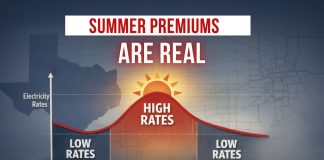You Might Be Paying More Than You Should—Right Now
Most of us don’t check our electricity contracts like we check the weather or the price of gas.
We sign up for a plan. We pay the bill. We go about our lives.
But here’s something a lot of folks in Diboll, Crockett, Alto, Wells, and other deregulated parts of Forest Country don’t realize:
When your electricity plan ends—and you don’t renew or switch—your rate can quietly go up.
Not by a few cents. Sometimes by 30% or more.
What Happens When a Plan Ends
When your contract expires, your provider can automatically roll you into a month-to-month plan—often with a much higher rate.
You’ll still get electricity.
Your lights will still work.
But your bill? It might slowly start climbing… and keep going.
And unless you dig through the fine print or check your rate online, you may not even realize it.
Real Story: A Local Family Pays the Price for “Not Knowing”
A couple in Alto contacted us last month. Their electric bill had been climbing every month since the spring.
They thought maybe it was just the AC or the weather.
Turns out, their contract had expired two months earlier, and they were being charged a fluctuating rate that changed with the wholesale market.
We helped them shop the current market and lock in a lower, fixed rate within the hour—and it didn’t cost them a dime.
You Don’t Have to Figure It Out Alone
At Amerigy Energy, we help homeowners across Forest Country figure out:
- If they’re on the wrong rate
- What their usage looks like
- Which plans are available right now
- How to get locked back into something predictable and affordable
There’s no fee, no pressure—just good neighbors helping neighbors.
It Only Takes 10 Minutes
Call 877-631-8875 and ask for Bryan—he helps residential customers just like you
Or email a copy of your most recent bill to info@amerigyenergy.com
Want to browse yourself? Visit AmerigyEnergy.com/shopnow
Final Thought
Electricity is something we all need—but paying too much for it isn’t.
If your contract ended and you didn’t know, you’re not alone.
But you can do something about it—and it’s easier than you think.
Call, email, or check online.
Because overpaying shouldn’t be your default.








